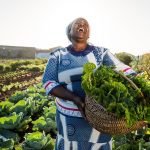
Western Kenya, encompassing the fertile regions from the western escarpments of the Rift Valley to the Lake Basin, stands as a critical food basket for the Kenyan economy. Counties like Uasin Gishu and Trans-Nzoia lead the country in maize production, contributing significantly to national output, while Kakamega, Bungoma, Kisumu and Nandi Counties is a hub for sugarcane cultivation. Despite the rich agricultural activity, the penetration rate of mechanized farming remains limited, hindering the full realization of the region’s agricultural potential.
The Current State of Agriculture in Western Kenya
Uasin Gishu and Trans-Nzoia Counties, for instance, are Kenya’s leading maize producers, with a combined annual output exceeding 10 million bags, accounting for nearly a third of the national production. Uasin Gishu also boasts substantial dairy production, yielding over 230 million liters of milk annually. Kakamega County leads the nation in sugarcane production, while Trans-Nzoia farmers cultivate a variety of food and cash crops, including maize, beans, potatoes, wheat, barley, and sorghum.
However, despite these impressive figures, the adoption of advanced agricultural technology and mechanization remains low. Most farmers in the region, traditionally older and resistant to change, have relied on conventional farming methods. This resistance has hindered the uptake of technologies that could significantly enhance productivity and efficiency.
The Shift Towards a Younger, Tech-Savvy Farming Population
Encouragingly, there is a noticeable shift as younger generations, including millennials and Gen Z, become increasingly involved in agriculture. This demographic change brings fresh perspectives and a greater openness to embracing technology and mechanization. Younger farmers, often more educated and tech-savvy, are more willing to adopt innovative farming methods, paving the way for a transformation in the agricultural landscape of Western Kenya.
The Role of Technology and Mechanization
Technological advancements and mechanization can revolutionize farming practices in the region. Modern equipment, such as tractors for ploughing, harrowing, and harvesting, as well as technologies for precision agriculture, can drastically improve productivity. Mechanized innovation like no-till planting reduces soil erosion and maintains soil structure intact.These innovations can reduce labor costs, increase efficiency, and enhance crop yields.
EFKen Leasing: Empowering Farmers with Asset Finance
EFKen Leasing, Kenya’s premier asset finance provider in the agricultural value chain, is well-positioned to support this burgeoning young farming population. By offering flexible financing options for acquiring modern agricultural machinery, EFKen Leasing enables farmers to invest in essential equipment without the burden of upfront costs. This support is crucial in helping farmers transition from traditional methods to mechanized farming, thereby boosting productivity and profitability.
Government Support: Catalyzing Agricultural Growth
County governments play a vital role in facilitating this agricultural revolution. By providing subsidies, training programs, and infrastructure development, they can encourage the adoption of modern farming techniques. Investments in rural roads, storage facilities, and irrigation systems can further support farmers in maximizing their output and accessing markets more efficiently.
The Importance of Seed Selection
In addition to mechanization and technology, seed selection is a critical factor in enhancing agricultural productivity. High-quality seeds, tailored to local conditions and resistant to pests and diseases, can significantly improve crop yields. Investing in research and development to produce superior seed varieties is essential in ensuring the success of the agricultural sector in Western Kenya.
Conclusion
Western Kenya stands on the brink of an agricultural renaissance, driven by a younger, more dynamic farming population and the integration of advanced technology and mechanization. EFKen Leasing’s asset finance solutions, combined with government support and strategic seed selection, can transform the region’s agriculture from traditional methods to modern, efficient practices. This evolution promises to enhance food security, increase farmer incomes, and contribute significantly to the Kenyan economy.
Pascal Omondi is the Business Development Manager for the Eldoret Region.




